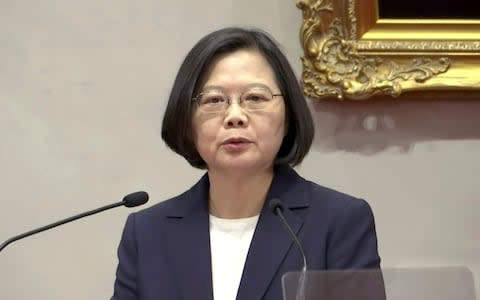Taiwan loses another ally as Kiribati switches allegiance to China

The tiny Pacific island nation of Kiribati severed ties with Taiwan on Friday, switching its diplomatic allegiance to China in the second such defection in a week.
"Kiribati today officially notified us that it was cutting diplomatic ties with our country," Joseph Wu, Taiwan's foreign minister, told reporters at a hastily organised press conference.
"Today we are also announcing that we are dropping ties with Kiribati," he added.
Earlier this week, Tsai Ing-wen accused China of “dollar diplomacy” after the Solomon Islands, a Pacific archipelago and former British protectorate of some 600,000 people, also changed its diplomatic recognition to Beijing.
“Over the past few years, China has continually used financial and political pressure to suppress Taiwan’s international space,” Ms Tsai said, calling the Chinese move “a brazen challenge and detriment to the international order.”
Kiribati is the seventh country to drop ties with Taiwan since Ms Tsai - who is viewed with deep suspicion in Beijing for not adhering to its ‘One China’ policy - took office in 2016.
China, which seeks to annex the island of 23 million, has tried to lure or pressure Taiwan’s diplomatic allies, claiming the state has no right to formal ties with any other nation, while trying to exclude it from international bodies such as the United Nations.

Some analysts believe Beijing’s relentless push to isolate Taipei internationally is part to a determined strategy by Xi Jinping, the Chinese president, to bring Taiwan under his control during his tenure.
Taiwan, meanwhile, operates like any other democratic nation with its own elections, government, currency, military and foreign policy and the majority of citizens identify as Taiwanese, enjoying visa-free access to 149 countries worldwide.
Taipei has now accused China of pressuring its allies to try to meddle in its January elections when Ms Tsai will stand for a second term.
The latest break leaves Taiwan with just 15 formal allies although it still enjoys strong informal relations with many countries, including the US, UK, Australia and Japan.
While the dwindling number of Taiwan’s formal supporters may have a limited effect on Ms Tsai’s electoral chances, there could be a more significant longer term impact on the US and its Pacific allies, who are nervous of China’s growing influence in the Indo-Pacific region.
“It is clear that broader geopolitics played as important a role in Beijing’s calculations as the desire to punish the Tsai administration,” wrote Michael Cole, a senior fellow in the Taiwan studies programme at Nottingham university, in the Nikkei Asian Review.
“In the Solomon Islands’ case, the aim is to undermine the US’s strategy in the Indo-Pacific and extend China’s influence closer to the US’s defensive line in the Western Pacific.”
As a result of the decision, Mike Pence, the US vice-president, reportedly cancelled plans to meet Manasseh Sogavare, the Solomon Islands prime minister, in the margins of the UN general assembly in New York next week.
